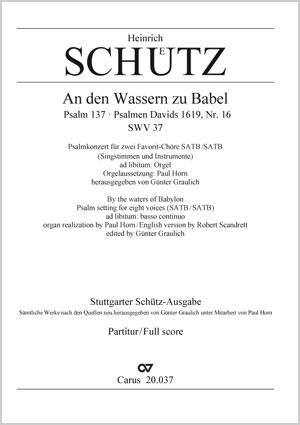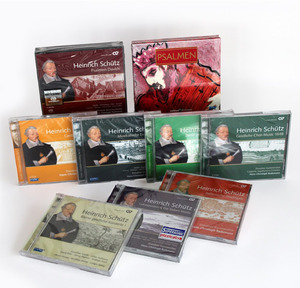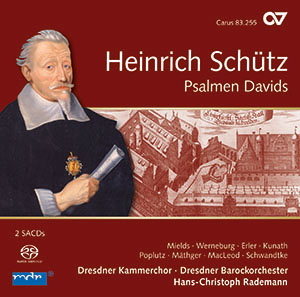
An den Wassern zu Babel saßen wir
extrait de : Psaumes de David SWV 37, 1619
Nachdem Schütz nach dem Tode Gabrielis von seinem Aufenthalt in Venedig in seine Heimat zurückkehrte, begann er die erworbenen Eindrücke musikalisch zu verarbeiten. Vor allem das mehrchörige Musizieren war hierbei sehr wichtig, wofür die zwischen 1615 und 1619 entstandenen Psalmen Davids ein Beleg sind.
Acheter
Informations complémentaires sur l'œuvre
-
Compositeur
Heinrich Schütz
| 1585-1672Heinrich Schütz is regarded as the first German musician of European stature. As a choirboy from 1599 at the court of Landgrave Moritz of Hessen-Kassel, he received a thorough education. In 1608 he began a law degree in Marburg, but broke this off in 1609 in order, with the support of the Landgrave, to study composition with Giovanni Gabrieli, organist at St Mark’s in Venice. In 1613 Schütz returned to Kassel, but two years later was enticed away by Elector Johann Georg I of Saxony to the Dresden court as “Organist und Director der Musica”, where he held the position of Hofkapellmeister (court Kapellmeister) from 1617 until his death. Schütz’s great cycles of vocal works marked the high point of his reputation in Germany and northern Europe. But these represent only part of Schütz’s output; individual works are represented in printed collections with works by other composers, others only survive in manuscript, and much has been lost. The Stuttgart Schütz Edition makes available Schütz’s complete oeuvre, and all works are also published in practical Urtext editions. Plus d'information sur la personne
-
Éditeur
Günter Graulich
| 1926L'éditeur, cantor et pédagogue Günter Graulich est l'un des éditeurs importants de l'après-guerre en Allemagne. En 1972, il fonda avec son épouse Waltraud les Editions Carus-Verlag, qu'il fit évoluer d'un bureau de 2 personnes à une entreprise de près de 60 employés. Lui-même cantor pendant de longues années à l'église St Matthieu de Stuttgart, il dirigea pendant plus de 50 ans le Motettenchor Stuttgart. Il réalisa avec ce chœur plusieurs enregistrements sur disques vinyls et CD, et de nombreuses tournées à travers l'Europe et l'Amérique. Plus d'information sur la personne
-
Basse continue réalisée
Paul Horn
| 1922-2016Paul Horn war ein deutscher Kirchenmusiker, Organist, Komponist und Musikwissenschaftler. Er studierte Kirchenmusik und Orgel an der Evangelischen Kirchenmusikschule Esslingen am Neckar bei Hans-Arnold Metzger und Musikwissenschaft, Theologie und Geschichte an der Universität Tübingen. Seine berufliche Laufbahn begann als Kantor an der Evangelischen Michaelskirche in Stuttgart-Degerloch. 1954 wurde er Kantor an der Evangelischen Stadtkirche Ravensburg, eine Position, die er bis zu seiner Pensionierung innehatte. Als Musikwissenschaftler arbeitete Horn bis ins hohe Alter eng mit Carus zusammen. So stammen zahlreiche Carus-Klavierauszüge aus seiner Feder. Plus d'information sur la personne
-
Traducteur
Robert Scandrett
| 1925-2014
Critiques
H
Heinrich Schütz: An den Wassern zu Babel
Der Zeitgenosse Scheins und Crügers, Heinrich Schütz, überragt beide durch seine musikgeschichtliche wie auch praxisbezogene Bedeutung. Bezüglich der Machbarkeit und Klangvorstellung seines vorliegenden „Psalmkonzerts” liegt er näher bei Hammerschmidt als bei Schein. Es ist die prachtvolle akkordische, im italienischen Concerto-Stil abgefasste Doppelchörigkeit. Freilich ist Schütz' Motette größer angelegt und auch in der Wort-Ton-Beziehung reicher und plastischer. Entsprechend der damaligen Aufführungspraxis können die Singstimmen durch Instrumente ersetzt bzw. ergänzt werden. Große Musik, die einigen Aufwand erfordert, aber ein unvergleichliches Klangerlebnis darstellt.
Quelle: Schwäbische Sängerzeitung 5/1997, S. 14
Questions fréquentes sur l'œuvre
 Il n'y a pas encore de questions et réponses concernant cette œuvre ou vous n'avez pas trouvé la réponse à votre question sur l'œuvre ? Cliquez ici et envoyez votre question spécifique à notre service clients.
Il n'y a pas encore de questions et réponses concernant cette œuvre ou vous n'avez pas trouvé la réponse à votre question sur l'œuvre ? Cliquez ici et envoyez votre question spécifique à notre service clients.







